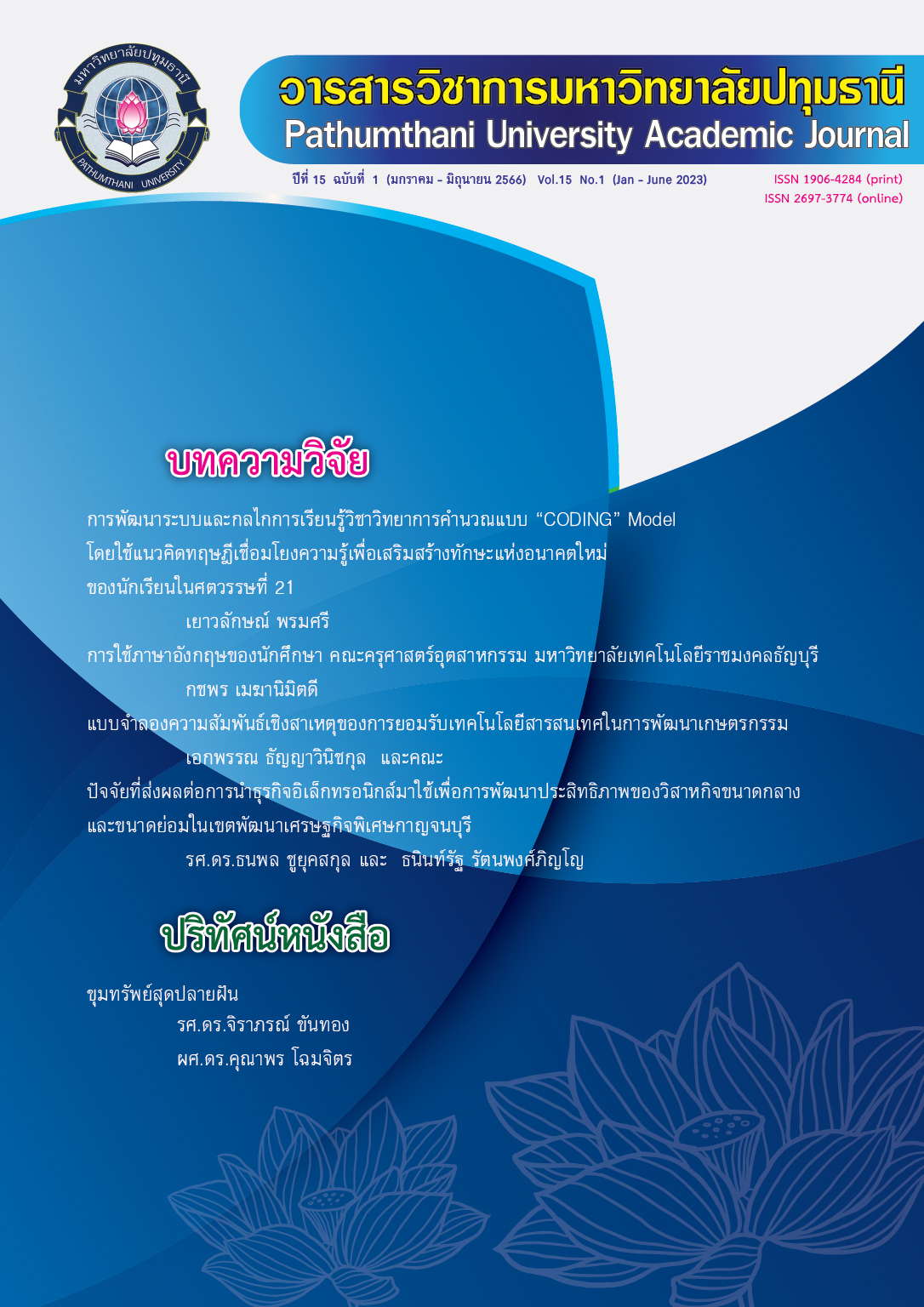FACTORS AFFECTING THE ADOPTION OF ELECTRONIC BUSINESS FOR EFFICIENCY IMPROVEMENT OF SMALL AND MEDIUM ENTERPRISES IN THE KANCHANABURI SPECIAL ECONOMIC ZONE
Keywords:
Organizational Culture , Competitive Environment , E-business Adoption Business, Efficiency Development of SMEsAbstract
The objective of this study is to examine: 1) the degree of organizational culture, competitive environment, and adoption of electronic business among medium and small enterprises, and their impact on efficiency development, 2) the interplay between organizational culture, competitive environment, and adoption of electronic business, and 3) the effect of electronic business adoption on efficiency development among medium and small enterprises within the Kanchanaburi special economic zone. The research participants consist of entrepreneurs, managers, and designated staff who can provide relevant information. The study used a questionnaire as a tool to collect data from 100 companies and analyzed the data by using structural equation modeling.
The study found that 1) the level of organizational culture, the competitive environment, the use of electronic business, and the development of the performance of medium and small enterprises, in general, were at a high level, 2) organizational culture and the competitive environment has a positive impact on the use of electronic business in terms of strategy, flexibility and ability to respond quickly create competitive advantages. and 3) the use of electronic business has a positive impact on the efficiency development of medium and small enterprises in terms of efficiency and sales growth.
References
กรมพัฒนาธุรกิจการค้า. (2564). ส่วนประมวลผลและวิเคราะห์ข้อมูลธุรกิจ. กองข้อมูลธุรกิจ. เขตพัฒนาเศรษฐกิจพิเศษกาญจนบุรี.
ธนาภิญญ์ อัตตฤทธิ. (2564). “อิทธิพลของการใช้งานธุรกิจอิเล็กทรอนิกส์ที่ส่งผลต่อการดำเนินงานของวิสาหกิจขนาดกลางและขนาดย่อมในประเทศไทย”. วารสารวิจัยราชภัฏเชียงใหม่. ปีที่ 22 ฉบับที่ 2 (พฤษภาคม-สิงหาคม).
สำนักงานส่งเสริมวิสาหกิจขนาดกลางและขนาดย่อม (สสว.). (2565). รายงานประจำปี 2564. สำนักงานสภาพัฒนาการเศรษฐกิจและสังคมแห่งชาติ กองยุทธศาสตร์การพัฒนาพื้นที่.
Alos-Simo, L., Verdu-Jover, A.J., Gomez-Gras, J.-M., (2017). “How transformational leadership facilitates e-business adoption”. Industrial Management & Data Systems. Vol 117. pp 382–397.. doi:10.1108/imds-01-2016-0038.
Chatzoglou, P., Chatzoudes, D. (2016). “Factors affecting e-business adoption in SMEs: empirical research”. Journal of Enterprise Information Management. Vol 29. pp 327–358. doi:10.1108/jeim-03-2014-0033.
Migdadi, M.M., Abu Zaid, M.K.S., Al-Hujran, O.S., Aloudat, A.M., (2016). “An empirical assessment of the antecedents of electronic-business implementation and the resulting organizational performance”. Internet Research. Vol 26. pp 661–688. doi:10.1108/intr-08-2014-0203.
Samaraweera, L. D., & Jayasiri, N. K. (2016). Adoption of E-Business and Business Performance of Hotel Sector in Sri Lanka. World Journal of Management. Vol 7. pp 13-30. doi.org/10.21102/wjm.2016.09.72.02
Shehata, G.M., Montash, M.A., 2019. “Driving the internet and e-business technologies to generate a competitive advantage in emerging markets”. Information Technology & People. Vol 33. pp 389–423. doi:10.1108/itp-10-2017-0360.
Downloads
Published
How to Cite
Issue
Section
License
Copyright (c) 2023 Tanapol Chooyuksakul, ธนินท์รัฐ รัตนพงศ์ภิญโญ

This work is licensed under a Creative Commons Attribution-NonCommercial-NoDerivatives 4.0 International License.
บทความที่ได้รับการตีพิมพ์เป็นลิขสิทธิ์ของวารสารมหาวิทยาลัยปทุมธานี
ข้อความที่ปรากฎในบทความแต่ละเรื่อง เป็นความคิดเห็นส่วนตัวของผู้เขียน กองบรรณาธิการไม่จำเป็นต้องเห็นด้วยเสมอไป และไม่มีส่วนรับผิดชอบใด ๆ ถือเป็นความรับผิดชอบของผู้เขียนแต่เพียงผู้เดียว



